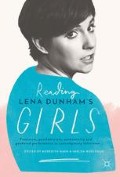Abstract
This chapter introduces readers to a range of scholarship and outlines the key reasons why the HBO TV series Girls has caused such controversy over its first five seasons, and why it is the show many feminists love to hate. The feminist content of this and other media productions, its relationship to a ‘postfeminist sensibility’, and the celebrity feminism of Lena Dunham are brought to the fore. This chapter reviews key critical scholarship in the area and highlights important new areas of investigation. With a helpful introduction to the work of each contributor, it responds to Girls as a millennial text with an important gendered message, whilst anticipating and foregrounding important criticisms of its blind spots, and the perils of putting feminism into popular culture.
Access this chapter
Tax calculation will be finalised at checkout
Purchases are for personal use only
References
Beale, C. (2016, January 29). Lena Dunham branded hypocrite for criticising Hollywood’s lack of diversity when Girls has all-white leads. Independent. Retrieved from http://www.independent.co.uk/arts-entertainment/lena-dunham-branded-hypocrite-for-criticising-hollywoods-lack-of-diversity-a6839136.html.
Bell, K. (2013). Obvie, we’re the ladies! Postfeminism, privilege, and HBO’s newest Girls. Feminist Media Studies, 13(2), 363–366.
Butler, J. (2013). For white girls only? Postfeminism and the politics of inclusion. Feminist Formations, 25(1), 35–58.
Crenshaw, K. (1989). Demarginalizing the intersection of race and sex: A black feminist critique of antidiscrimination doctrine, feminist theory, and antiracist politics. University of Chicago Legal Forum, 139–67.
Ford, J. (2016). The ‘smart’ body politics of Lena Dunham’s Girls. Feminist Media Studies, 16(6), 1029–1042.
Fuller, S., & Driscoll, C. (2015). HBO’s Girls: Gender, generation, and quality television. Continuum: Journal of Media & Cultural Studies, 29(2), 253–262.
Gerhard, J. (2005). Sex and the City: Carrie Bradshaw’s queer postfeminism. Feminist Media Studies, 5(1), 37–49.
Grdešić, M. (2013). I’m not the ladies! Metatextual commentary in Girls. Feminist Media Studies, 13(2), 355–358.
Lowrey, A. (2013, March 26). Do millennials stand a chance in the real world? New York Times. Retrieved from http://www.nytimes.com/2013/03/31/magazine/do-millennials-stand-a-chance-in-the-real-world.html?_r=0.
Lyons, K. (2016, March 7). Generation Y: A guide to a much-maligned demographic. The Guardian. Retrieved from https://www.theguardian.com/world/2016/mar/07/millennials-generation-y-guide-to-much-maligned-demographic.
McDowell, L. (2012). Post-crisis, post-Ford and post-gender? Youth identities in an era of austerity. Journal of Youth Studies, 15(5), 573–590.
McRobbie, A. (2009). The aftermath of feminism: Gender, culture and social change. London: Sage.
Ouellette, L. (2002). Victims no more: Postfeminism, television, and Ally McBeal. The Communication Review, 5(4), 315–335.
Springer, K. (2007). Divas, evil black bitches, and bitter black women: African American women in postfeminist and post-civil-rights popular culture. In Y. Tasker & D. Negra (Eds.), Interrogating postfeminism: Gender and the politics of popular culture (pp. 249–277). Durham: Duke University Press.
Watson, E. (2015). Lena Dunham: The awkward/ambiguous politics of white millennial feminism. In E. Watson, J. Mitchell, & M.E. Shaw (Eds.), HBO’s Girls and the awkward politics of gender, race, and privilege (pp. 145–166). Lanham: Lexington Books.
Watson, E., Mitchell, J., & Shaw, M.E. (2015). Introduction: Reading into Girls, writing what we read. In E. Watson, J. Mitchell, & M.E. Shaw (Eds.), HBO’s Girls and the awkward politics of gender, race, and privilege (pp. 1–8). Lanham: Lexington Books.
Woods, F. (2015). Girls talk: Authorship and authenticity in the reception of Lena Dunham’s Girls. Critical Studies in Television, 10(2), 37–54.
Author information
Authors and Affiliations
Corresponding author
Editor information
Editors and Affiliations
Rights and permissions
Copyright information
© 2017 The Author(s)
About this chapter
Cite this chapter
Nash, M., Whelehan, I. (2017). Why Girls? Why Now?. In: Nash, M., Whelehan, I. (eds) Reading Lena Dunham’s Girls. Palgrave Macmillan, Cham. https://doi.org/10.1007/978-3-319-52971-4_1
Download citation
DOI: https://doi.org/10.1007/978-3-319-52971-4_1
Published:
Publisher Name: Palgrave Macmillan, Cham
Print ISBN: 978-3-319-52970-7
Online ISBN: 978-3-319-52971-4
eBook Packages: Literature, Cultural and Media StudiesLiterature, Cultural and Media Studies (R0)

